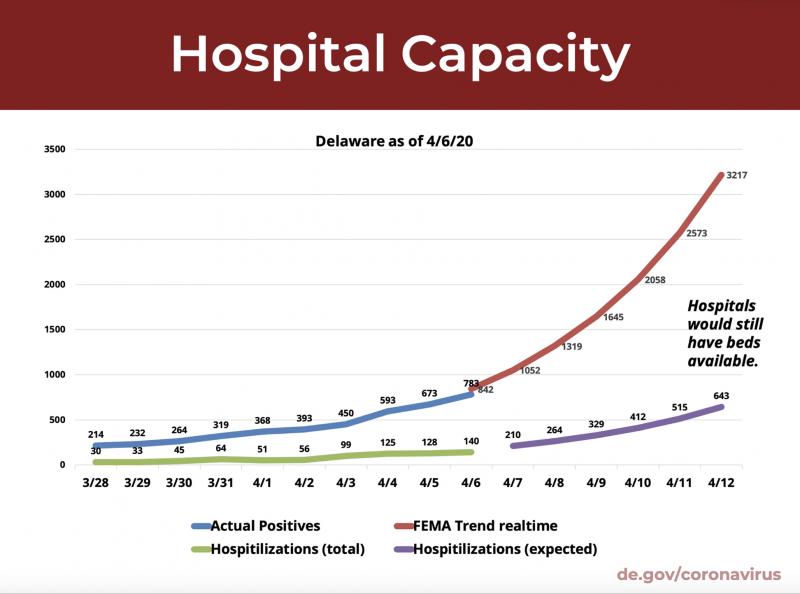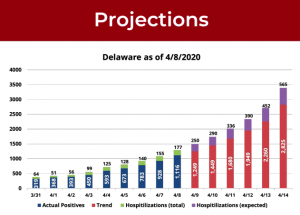Hospitals and state officials are focusing on capacity as the number of COVID-19 cases continue to rise and Delaware's peak has yet to come.
“We're watching hospital capacity. We need to know what the hospitals can manage, what their limiting factors are and then what the state can do to assist,” said A.J. Schall, director of Delaware Emergency Management Agency, during a press conference April 7.
On April 9, Gov. John Carney revised previous projections with new estimates that would put 565 in hospitals by April 14 – a decrease from earlier projections that estimated 643 people would be hospitalized by April 12. Carney said the state will continue to be conservative in projecting future hospitalizations using 20 percent of the total number of positive COVID-19 cases to determine how many may end up in the hospital. The Division of Public Health reported the number of people hospitalized as of April 9 was 201.
“We need to make sure we are erring on the high side of some of these numbers,” Schall said. “Five days from now the hospitals would still be managing within their walls, within their staff very comfortably without implementing too many surge or decompression options. They've already canceled elective surgery. Their occupancy now is a little lower than normal. We have that variance in our favor, we have these surge options. For the next five to seven days, I feel confident that the hospitals will be able to adequately respond to the increased demand.”
Carney said he has taken issue with a University of Washington Institute of Health Metrics and Evaluation model that shows Delaware has already hit its peak.
“Well, that is not true,” he said. “The projections that we have and the report from today is that the number of cases has increased again … and the hospitalization number will jump as well.”
Carney said the state is comfortable that it will have enough ventilators at the hospitals, which have 400 at the moment. Newark-based manufacturer Bloom Energy is refurbishing 100 ventilators, he said, and Delaware has an order from the federal government for 50 ventilators – 15 of which have been received.
As for personal protection equipment, Schall said they have requested more items, but they are not sure when they will arrive. “We're not out of the woods for anything that we've requested yet,” he said.
Schall said he has ordered a week’s worth of gloves, but they won't know for another week if they will get the shipment.
“We're approaching it from multiple angles, and making sure we don't have equipment here that we don't need at this time,” he said.
Mobile unit
Schall said some hospitals are talking about sharing overflow, if it comes down to that. “The hospitals are doing 80 percent of the lift here. We're just helping them make the partnerships and any way we can with supplies, the National Guard and some of these alternative sites,” he said.
In Sussex County, Beebe Healthcare, Bayhealth and Nanticoke Memorial Hospital are working together to decide where a stand-up mobile hospital will go to handle overflow patients, Schall said.
The Delaware National Guard will help prepare the mobile hospital and help operate it, he said. The mobile hospital can potentially treat 50-60 patients who do not have COVID-19, and fewer if they have COVID-19.
Schall said officials decided against using the old Milford Memorial Hospital because hospital officials said they preferred having a unit across the street instead of down the road.
“We want them to tell us where it will be the most impactful, where they have those nurses, doctors and staff to help it,” he said. “I hope we build a mobile hospital and we never have to put one person in there because that's good for Delaware, but I don't want it not ready when we need it.”
At Beebe Healthcare, the main hospital in Lewes has 210 beds, and the current census is 100, down from a normal of about 150, said Rick Schaffner, executive vice president and chief operating officer. “It's down but we've maintained our staffing,” he said, during a virtual town hall April 6.
Several questions raised during the town hall focused on recent reports of out-of-state visitors taxing Beebe's healthcare facilities. One doctor said he is seeing more patients from New York, New Jersey, Connecticut, Massachusetts, Washington, D.C., Maryland and Virginia coming in for screening and testing. At some point, he said, they will become positive and will burden the local healthcare system, which is not designed to take care of patients from other states.
Speaking on a Washington, D.C. television station, Rehoboth Beach Mayor Paul Kuhns said more than half of the COVID-19 patients at Beebe were from out of state.
Dr. David Tam, president and chief executive officer, said the information he shared was not entirely accurate. “We were able clarify with him the information that he had, and now I've developed new ways that we can communicate with our elected officials,” he said.
Tam said Beebe Healthcare is prepared to take care of local residents but also those who work in the area, reside here on a temporary basis, or who come to visit.
“Beebe Healthcare has taken on the responsibility of ensuring that we meet our mission to take care of everybody who comes here and ask all people, not just residents, to practice good social and physical distancing, hand washing, and let us know if they need to be screened or tested for the COVID-19 coronavirus.”
Tam did not say how many patients treated at Beebe are from other states.
“Once again, I think that is a very difficult question to answer because things like percentage of out-of-state patients, is that visitors, or is it people who come here two months out of the year, or six months out of the year, or eight months out of the year? I can tell you that as a brand-new resident to Lewes after coming here from California almost three weeks ago, it is a challenge to identify that.”
Melissa Steele is a staff writer covering the state Legislature, government and police. Her newspaper career spans more than 30 years and includes working for the Delaware State News, Burlington County Times, The News Journal, Dover Post and Milford Beacon before coming to the Cape Gazette in 2012. Her work has received numerous awards, most notably a Pulitzer Prize-adjudicated investigative piece, and a runner-up for the MDDC James S. Keat Freedom of Information Award.






















































